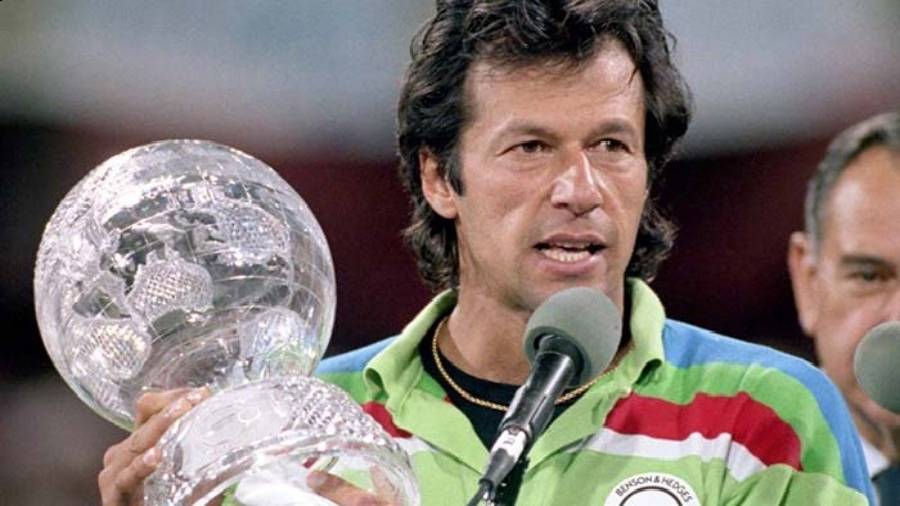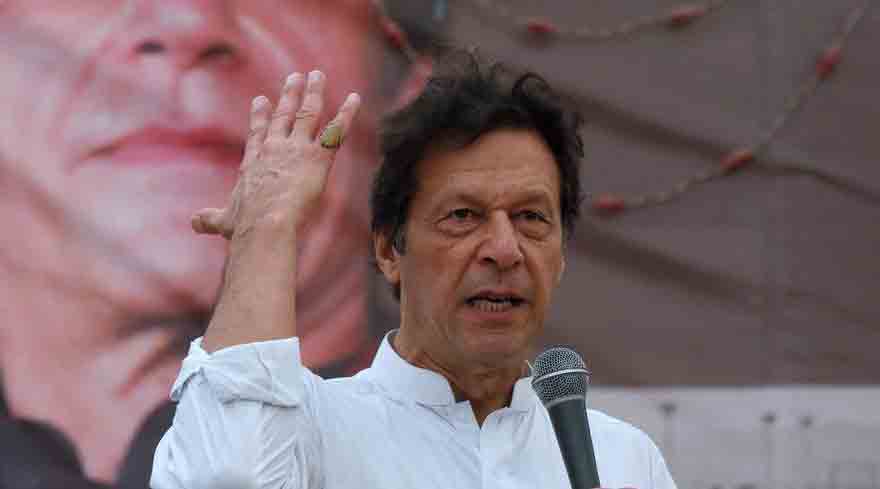Pakistan Prime Minister Imran Khan lost a crucial trust vote in the National Assembly past midnight on Saturday, becoming the first premier in the country's history to be removed through a no-confidence motion. Khan, 69, was not present in the lower house at the time of voting. His party lawmakers staged a walkout.
The joint Opposition - a rainbow of socialist, liberal and radically religious parties - secured the support of 174 members in the 342-member National Assembly, more than the needed strength of 172 to oust the prime minister on a day full of drama and multiple adjournments of the lower house. No prime minister in Pakistan's history was ever ousted through a no-confidence motion. Khan is the first premier whose fate was decided through a trust vote. Also, no Pakistani prime minister has ever completed a full five-year term in office.
The Opposition had filed the no-confidence motion on March 8, setting a set of events leading to the day of voting and rise in the tension due to Khan's insistence that he was being targeted as part of a foreign conspiracy with the collaboration of top opposition leaders. Khan, who came to power in 2018 with promises to create a Naya Pakistan', was dogged by claims of economic mismanagement as his government battled depleting foreign exchange reserves and double-digit inflation.
He apparently also lost support of the powerful Army after he refused to endorse the appointment of the ISI spy agency chief last year. Finally he agreed but it soured his ties with the powerful Army, which has ruled the coup-prone country for more than half of its 75 years of existence and has hitherto wielded considerable power in the matters of security and foreign policy.
Khan wanted to keep Lt Gen Faiz Hameed as the spy chief but the army high command transferred him by appointing Corps Commander in Peshawar. Ahead of the voting, National Assembly Speaker Asad Qaiser and Deputy Speaker Qasim Suri resigned. Qaiser said he could not take part in a foreign conspiracy to oust the prime minister.
After announcing his resignation, Speaker asked Ayaz Sadiq of PML-N to chair the proceedings. Voting on the resolution then began at 11:58pm (local time). Sadiq adjourned the house for two minutes due to the change of day at 12. The new session then began at 12:02am.
Earlier, the crucial session convened in line with a landmark Supreme Court ruling to decide the fate of Prime Minister Khan witnessed multiple adjournments and heated arguments.
PTI

Imran Khan holds the 1992 World Cup after Pakistan defeated England at the MCG File Picture
Imran Khan - a leader whose cricketing career overshadowed his political journey
Islamabad: Pakistan's cricketer-turned politician Imran Khan, who turned his shaky team into champions in the 1992 Cricket World Cup, failed to repeat the same charisma in politics where he was run out by a determined Opposition in the middle of his first innings.
Khan, who effectively lost majority in the 342-member National Assembly, dissolved Parliament and called for fresh election on April 3 after the deputy speaker blocked a no-confidence motion against him.
However, a five-member bench of the Supreme Court headed by Chief Justice Umar Ata Bandial in a landmark 5-0 verdict on April 7 struck down the deputy speaker's ruling and ordered the speaker to call a session on April 9 to organise the no-confidence vote. Khan failed to pass his toughest political test since assuming office in 2018 due to defections in his party and cracks in the ruling coalition. He is the first premier in Pakistan whose fate was decided through a trust vote.
The Oxford-educated Pasthun came to power in 2018 with promises to create a Naya Pakistan' but miserably failed to address the basic problem of keeping the prices of commodities in control.
Khan apparently also lost support of the powerful Army after he refused to endorse the appointment of the ISI spy agency chief last year. Finally he agreed but it soured his ties with the army, which has ruled the coup-prone country for more than half of its 75 years of existence and has hitherto wielded considerable power in the matters of security and foreign policy.
Khan, whose 21-year cricketing career overshadowed his 26-year political journey, treated almost all Opposition leaders with disdain, often using derogatory remarks for them while in power, giving them a reason to unite under one banner and successfully topple his government.
Last time when Khan sought a trust vote, he comfortably won it after an embarrassing defeat in a hotly-contested Senate election in March 2021.
Khan launched Pakistan Tehreek-e-Insaf, which means the movement for justice, in 1996, but struggled to break the dominance of the Pakistan Muslim League-Nawaz (PML-N) and Pakistan Peoples Party (PPP) - the two main political parties that have been repeatedly in power when the military was not ruling the country.
Unable to break PML-N and PPP dominance for years, he even once said, "In Pakistan politics is hereditary", referring to the leaders of PML-N and PPP parties which are led by the Sharif family and the Bhutto family respectively.
Khan became a Member of Parliament in 2002. He was again elected to the National Assembly in 2013. One year after elections, in May 2014, Khan alleged that the polls were rigged in favour of the ruling PML-N led by then prime minister Nawaz Sharif.
In August 2014, Khan led a rally of his supporters from Lahore to Islamabad, demanding Sharif's resignation and investigation into alleged electoral fraud. Khan led his party to victory in the 2018 general elections during which he had promised to crackdown on corruption, enact anti-poverty programmes, improve healthcare and education and turn his country into an Islamic welfare state. While in power, Khan repeatedly talked about making Pakistan an Islamic welfare state. However, he failed to fix the economy and the basic problem of keeping the prices of commodities in control.
On the foreign policy front, Khan had frosty relations with the West, especially the US. Khan tried to cultivate close ties with Russia while further strengthening ties with all weather ally China. During Khan's tenure, ties between Pakistan and India were further strained in 2019 when a Pakistan-based terror group killed 40 CRPF personnel in a suicide attack in February, forcng India to bomb the terror camps in Balakot in Khyber Pakhtunkhwa.
An intense aerial confrontation ensued between both countries the next day, in which Indian Air Force Wing Commander Abhinandan Varthaman was captured and later released by Pakistan.
The relations deteriorated after India announced withdrawing the special powers of Jammu and Kashmir and bifurcation of the state into two union territories in August, 2019. Khan, who insists that the Kashmir dispute remained a big issue between the two countries, raised the issue on multiple forums including the United Nations during his tenure. India has repeatedly told Pakistan that Jammu and Kashmir "was, is and shall forever" remain an integral part of the country.
Later in 2019, Prime Minister Khan formally inaugurated the Kartarpur Corridor, paving the way for Indian Sikh pilgrims to visit one of their religion's holiest sites in Pakistan without needing a visa. Khan, once touted as Pakistan's most eligible bachelor for his rugged Pathani good looks, married thrice. His previous two marriages ended in divorce. His first marriage was with Jemima Goldsmith, daughter of a British billionaire, in 1995, which lasted 9 years. Khan has two sons from her. His second marriage with TV anchor Reham Khan in 2015 ended after a brief 10 months.
In 2018, Khan married for the third time. This time with his "spiritual guide" Bushra Maneka. Khan was born in Mianwali in 1952 to Ikramullah Khan Niazi and Shaukat Khanum. His father descended from the Pashtun Niazi tribe of the Shermankhel clan.
He attended Aitchison College in Lahore and the Royal Grammar School Worcester in England. Khan played Test cricket for Pakistan between 1971 and 1992, and was captain of the national team when they won the World Cup in 1992 - the country's first and only victory in that tournament.
PTI










